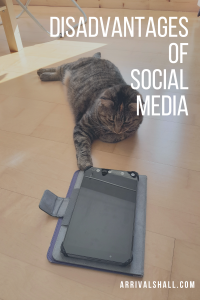I’ve written about the benefits of social media for businesses and how the social media platforms have tremendous power in the world at large.
Social media has personal advantages such as being a source of inspiration, information, entertainment, connection to the wider community, and preventing boredom when unexpected delays arise.
On the downside, it’s widely reported that one of the main disadvantages of social media is cyberbullying.
I recently got my hands on Stolen Focus by Johann Hari and Digital Minimalism by Cal Newport, and both expand on the disadvantages. Hari and Newport explore our use/overuse of technology, more specifically, the problem of social media negatively affecting our lives. Both made me seriously examine my own social media use.
Given that there are pros and cons of social media use, we need a healthy balance between online and offline activity. This post raises awareness of the many other disadvantages of social media, and explores how to achieve a healthy balance between offline and online activity.
DISADVANTAGES OF SOCIAL MEDIA
Physical
- Musculoskeletal problems from poor posture and overuse of wrists/thumbs.
- The inactive lifestyle of someone with excessive social media use puts them at risk of unhealthy weight gain and cardiovascular disease.
- Blue light emitted can disrupt natural sleep cycles, accelerate the skin’s aging process, and cause eye strain.
Psychological
- Negatively affects self-esteem and self-worth by becoming dependent on the number of likes and followers, obsessively trying to achieve perfection, and by comparison with others.
- There are negative psychological consequences of envying influencers.
- Users may be unable to understand that social media content can be curated to sell products and is often not representative of everyday living.
- Judging others/situations and jumping to conclusions without seeing the whole picture.
- Without body language and tone of voice, content can easily be misinterpreted.
- Fear of missing out (FOMO) creates anxiety and loneliness.
- The algorithms are pushing inappropriate material. For example, a study carried out by Dublin City University shows that the recommender algorithms used by certain social media platforms amplify misogynistic and male supremacist content.
- Addiction to social media can impair other important areas of life. Johann Hari explores how social media algorithms are designed to keep us hooked.
- Unless you’re making a living from social media, it can be a complete waste of time.
To summarise, you’ve an unhealthy relationship with social media if you compare yourself to others, are constantly checking the apps, get anxious when you’re not online, obsess over your online persona, or interrupt an offline conversation/situation by going online. It should be social media, not anti-social media.
HOW TO GET THE SOCIAL MEDIA BALANCE RIGHT
Cal Newport suggests digital minimalism as the answer to our technology overload. He defines digital minimalism as a philosophy of technology use in which you focus your online time on a small number of carefully selected and optimized activities that strongly support things you value, and then happily miss out on everything else. He suggests a digital declutter of 30 days and reintroduce the technology sparingly.
Douglas Rushkoff offers a number of solutions to the problems created by the digital age in his book Program or be Programmed: 10 commandments for a digital age.
Here are some of my ideas on how to find a healthy balance for social media use:
- Allocate times to use social media and not use it (e.g. 10pm is my cut-off point).
- Have some rules about where you use it (e.g. only when commuting, not when eating).
- When starting a social media session, have a specific goal (e.g. find information on products) and exit the platform when you have achieved that goal. Or allocate a time limit for searching. These approaches require discipline.
- Be discerning about the accounts you follow. Outside of friends and family, follow accounts that are useful, inspire and/or educate. Social media companies can push accounts into your feed that you don’t follow. Disengage with this content, adjust your settings, or simply exit the platform during that session.
- Steer clear of accounts with clickbait and/or negative content. Unfollow them. Mute or block them if they appear on your feed. They’ll only raise your blood pressure.
- Bear in mind that social media content can be curated and photo-edited. For some, it’s a business and they want you to buy their products/service. Be discerning.
- Don’t share very personal information such where you’re going.
- And finally, rediscover the advantages of offline activity such as meeting people in person and enjoying the great outdoors.
LIVING WITH LESS SOCIAL MEDIA
I promote my blog and products/services through social media, so it must be strange to see me advocate for social media minimalism. For me, undisciplined social media use is both unhealthy and a waste of time. Health is a precious resource, time a finite one.
We all want to be liked and we all want to belong. You can easily find your tribe on social media but having real-life networks is positively correlated with subjective well-being.
Social media is great for business. It’s great for personal life as well but you have to be a little more discerning in the time and energy you devote to it. Everything in moderation, as they say.

